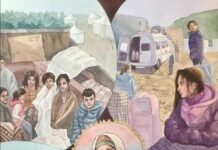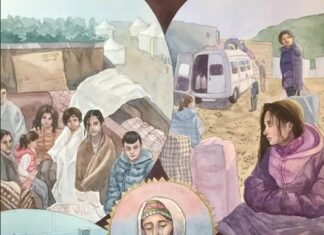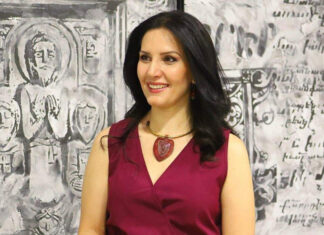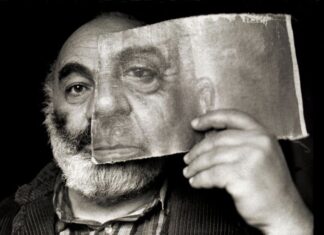It took seven years living in Los Angeles to realize it was not the city that Adam, whose dearest friend “believed him to be mad,” had admired as a young boy in Lebanon. Much as it gave him a feeling of normalcy and of belonging, the city also pushed the “crazy handsome” Angeleno to “the brink.” It is difficult to miss the truth of the Kurd’s pronouncement following Adam’s death, “America killed [Adam].” Adam Derderian, the protagonist of Aris Janigian’s newly-released novel, This Angelic Land (West of West Books 2012), is a victim of the senseless violence that overtook the city of Los Angeles following the acquittal, in 1992, of the white offi- cers who had savagely beaten a black construction worker named Rodney King during a traffic stop. Janigian tells his story against the backdrop of what came to be known as the Rodney King Riots.
The novel follows Adam who, with his family, while still a boy, flees the Civil War in Lebanon to start a new life in America. Adam settles in Los Angeles, the “cool and agile” city that provides exiles like him a chance to reinvent themselves. “Anything was possible in LA,” writes Janigian. It is through his engagements with Sacha (a curator from Iran), the Wizard (a Jewish professor who takes Adam under his wing), the Kurd (a landscape artist and “buddy” to Adam) and other exiles who had fled a bloody past in search of a new home, that we get to know Adam’s sweetness and generosity. Adam never holds a grudge. His selflessness is evident in his support of his immigrant parents whom he cares for while his older brother Eric settles in New York in pursuit of his own dreams.
Adam’s kindness, however, his youth and his beauty, are no match for the subtle, and the not so subtle, destructive forces surrounding him. The special bond he has with a strong-willed and spirited grandma — the only survivor of the death march — and “the shelter of a family” prove inadequate against the disdain and the darkness of a burning city. “And yes, there was a dark irony in the fact that [Adam was] now reliving the horrors [he] had crossed half the world to escape,” writes Janigian. The city where he comes to survive abruptly ends Adam’s life.
This Angelic Land explores a dangerous topic unflinchingly. Janigian recreates the King Riots, an episode he says he “personally went through and never got over.” “It’s a massive event but we have no literature about it,” he adds, incredulous. Perhaps race is too hot a topic to handle and the central issue of the riots is race. Nonetheless, Janigian “tells it the way it happened here,” giving us an almost mythic recreation of the brutal beatings and of the lootings and the fires that consumed the city following the “not guilty” verdict. He
writes about white boys and black boys and that in-between world that his Lebanese- Armenian protagonist has to traverse. Adam, who could easily be taken for a white boy, but who was not a white boy, is the perfect metaphor for the American experience, says Janigian. “The experience of becoming American is the central American experience,” he adds.









